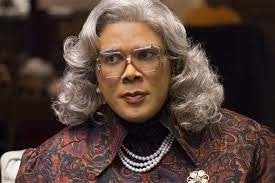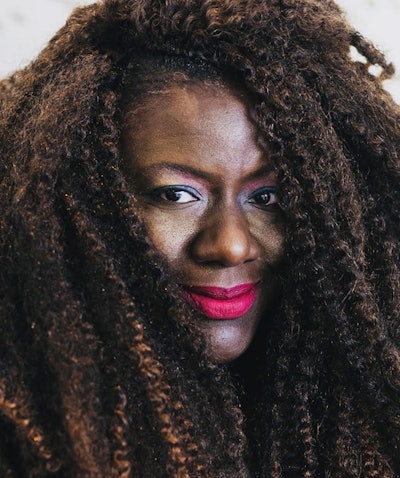As the fall term picks up speed, college students around the country are digging into the works of Shakespeare, One Hundred Years of Solitude, and Between the World and Me. But for 14 freshmen at Emory University’s Oxford College, the syllabus may include House of Payne and Madea’s Family Reunion.
"In the Language of Folk and Kin: The Legacy of Folklore, the Griot, and Community in the Artistic Praxis of Tyler Perry,” is the first class focusing on the life and work of the Atlanta-based multihyphenate behind Madea, the fiercely protective gun-toting grandmother character whose films have grossed almost $700 million at the box office. Madea
Madea
In the class, students study Perry’s speeches, plays, films, and TV shows in conversation with canonical Black authors and poets like Zora Neale Hurston and Paul Laurence Dunbar. They explore the relationships between Perry’s work and traditions like Greek mythology and the blues. And they use Perry’s life story, a journey from homelessness to moguldom, as a springboard for their own writing and reflection. In a recent class, an interview with People magazine in which Perry discussed his childhood rape and his use of writing as an escape led to a multi-layered conversation about the nuances of speaking out and the complexities of expressing emotion. It’s a far cry from slapstick comedy.
The students in the class hail from an eclectic array of backgrounds, from South Korea to Birmingham. Some are bona fide Perry fans and some have never seen one of his movies. They’re taught by Dr. Tameka Cage Conley, an assistant professor of English and creative writing who has followed Perry’s work ever since encountering recordings of his plays as a 23-year-old graduate student.
Cage Conley was inspired to create the course after the death of her grandmother, who she saw as a Madea-like figure.
“The Madea character is a caregiver at the core. She’s tough, but that toughness is not without love,” said Cage Conley. “[My grandmother] held me up, sustained me, believed in me, and sacrificed so much.”
Cage Conley sees Perry’s work as centering unsung community heroes, people like her grandmother who, although they may never have gone to college themselves, support future generations so that they can experience success. Her students can relate.
“I felt like I personally had a Madea in my family in my grandma—a strong woman figure at the front of our family who was essentially taking care of everything and always there to protect us,” said Sarang Arun, a student in the class. “Tyler Perry does a great job at depicting dynamics in a lot of minority families, not just Black families.” Dr. Tameka Cage Conley
Dr. Tameka Cage Conley
Perry’s work, however, has found detractors both in and out of the academy. Reviewers have derided his writing as formulaic and cliché. And others have said that his work is socially harmful. Spike Lee once described Madea, who Perry plays, as “coonery buffoonery,” and journalists and scholars have accused Perry of promoting racial and gender stereotypes. His depiction of women has received particular disapprobation, with many arguing that Perry often portrays female characters as needing a man to fix them.
But Cage Conley argues that the merits of Perry’s work are best appreciated through a specific lens.
“Tyler Perry’s work has been under-studied critically because people were not thinking about it in the particular way that he’s interested in telling stories,” she said. “His particular form of story-telling is rooted in a folklore aesthetic. It is rooted in the daily lives, survival, troubles, and pains of African-American communities. He finds a story in that which is common.”
“We don’t have to charge any one filmmaker with capturing the entirety of Black experience,” said Cage Conley. “If you try to make him an artist that he is not compelled to be, then you might miss his particular aesthetic. And you might miss the fact that he’s trying to tell a unique story about a community of people, black working-class people from the south, who might not feel that their particular ways of being in the world are regarded as relevant, important, or valid.”
The critiques of Perry are also incorporated into the course. A recent class featured a discussion of Perry’s public war of words with Spike Lee, raising complex questions about the relationships between art, taste, and cultural background.
Ultimately, Perry’s enormous impact—he is the only Black person to own a major film studio and has given opportunities to an entire ecosystem of Black talent—is a reason enough to study him, according to Dr. TreaAndrea Russworm, a professor in the School of Cinematic Arts at the University of Southern California and editor of From Madea to Media Mogul: Theorizing Tyler Perry.
“He is a powerful, influential media maker and has been doing this stuff for 30 years,” she said. “So, whether we like him or not, he always justifies being thought about critically.”
For Russworm, the questions surrounding Perry’s work are all the more reason to closely examine his contributions to the traditions of Black theater, film, and television.
“When we think about, ‘What does he actually contribute to those traditions?’ I think it’s complicated,” she said. “And I think that that’s exactly why he has to be studied.”


















